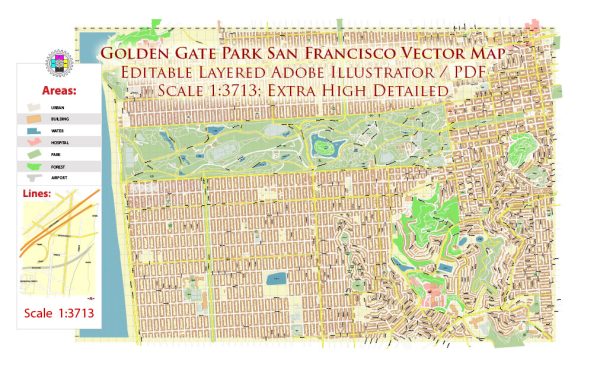Golden Gate Park, located in San Francisco, California, is one of the most iconic and historically significant urban parks in the United States. Its history is intertwined with the growth and development of the city, as well as broader cultural and social trends. Here is a brief description of the history of Golden Gate Park:
- Origins and Planning:
- Golden Gate Park’s history dates back to the mid-19th century. In the 1860s, San Francisco was a rapidly growing city, and civic leaders recognized the need for a public park to provide green space and recreation for its residents.
- The park’s initial concept was inspired by the urban parks of Europe, such as Central Park in New York City. It was designed as an expansive, picturesque space for leisure and cultural enrichment.
- Park Design and Development:
- The park’s design and development were overseen by William Hammond Hall and John McLaren. John McLaren, in particular, is known as the “father” of Golden Gate Park and served as its superintendent for over 50 years.
- Construction of the park began in the 1870s, and it was a massive undertaking that involved reshaping sand dunes and marshes into a lush and well-landscaped park. The park’s features include meadows, lakes, gardens, and cultural institutions.
- Cultural and Recreational Amenities:
- Over the years, Golden Gate Park has added numerous cultural and recreational amenities, making it a hub for arts, science, and outdoor activities.
- Notable institutions within the park include the de Young Museum, the California Academy of Sciences, the Conservatory of Flowers, and the Japanese Tea Garden.
- The park also features recreational areas, including tennis courts, playgrounds, and opportunities for hiking, cycling, and picnicking.
- Historical Landmarks:
- Golden Gate Park is home to several historical landmarks, including the Music Concourse, which hosts concerts and events, and the iconic Dutch Windmill.
- The park’s iconic structures and landmarks have played important roles in the cultural life of San Francisco.
- Cultural and Social Significance:
- Golden Gate Park has been a site for significant cultural and social events throughout its history. It has hosted countless concerts, festivals, and political rallies.
- It was a focal point of the counterculture movement in the 1960s, including the famous “Summer of Love.”
- The park continues to be a beloved gathering place for San Franciscans and visitors alike.
- Conservation and Preservation:
- Golden Gate Park’s continued existence and beauty have been a result of ongoing conservation and preservation efforts. The park’s unique ecosystem is home to a variety of plant and animal species.
- The park is now managed as part of the larger Golden Gate National Recreation Area.
Golden Gate Park’s rich history reflects the evolution of San Francisco as a city and its commitment to providing green spaces and cultural amenities for its residents. Today, the park remains a symbol of the city’s beauty and cultural vibrancy.



 Author: Kirill Shrayber, Ph.D. FRGS
Author: Kirill Shrayber, Ph.D. FRGS